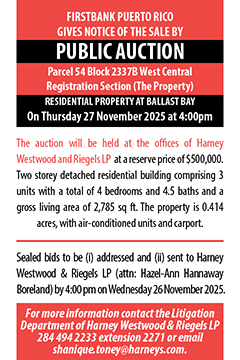A call to celebrate Virgin Islands political freedom
The Virgin Islands' freedom to make its own political and economic decisions is often taken for granted by locals and non-locals alike who are unfamiliar with the modern history of the islands.
All too often it is assumed that either self-government has always been in place or that the United Kingdom (UK) in its benevolence instituted self-government. Neither is the case.
The historical record shows that self-government in the Virgin Islands, and democracy for that matter, came about as a result of the demand by the people of the Virgin Islands for the British Empire to re-establish local decision making and political representation on the islands during the middle of the 20th century.
This history is largely unknown by the population today and not well integrated into the school system or into the residency, Belonger and naturalisation processes.
A lack of awareness of the modern history of the Virgin Islands from the mid-20th century onward may be a contributing factor to the much-diminished pride in the Virgin Islands by many locals and non-locals.
The occasion of the 70th anniversary of the House of Assembly on 20th November 2020 is an opportunity to educate the public on how the Virgin Islands came to have self-government and democracy that have been instrumental in the islands' progress and upheld the dignity of Virgin Islanders as a people.
The House of Assembly's modern history as a legislature provides a lens through which to see how self-government and democracy were actually achieved.
The legislature's historical roots are in the Great March of November 24, 1949 when more than 1,500 Virgin Islanders converged on Road Town in a peaceful demonstration to protest the gross neglect of the British Empire and to demand the return of local decision-making and political representation in the governance of the islands after five decades of direct rule in which the Virgin Islands was the poorest part of the Federal Colony of the Leeward Islands.
In response to the Great March, the Colony's General Legislative Council based in Antigua adopted the first modern Constitution for the Virgin Islands in July 1950 based on the recommendations of a local Constitutional Committee in the Virgin Islands chaired by the late Honourable Howard Penn, OBE.
The new Constitution provided for a legislature to make laws for the islands in the form of a restored Legislative Council that was earlier abolished in 1902. The Legislative Council's initial composition included both elected and appointed members.
The first election under the new Constitution was held on November 20, 1950, after which the elected and appointed members took their seats that officially reconstituted the Legislative Council. However, until 1967 executive power remained under British authority in the person of the Commissioner whose title later changed to Administrator and then Governor.
This was the first measure of internal self-government achieved in the Virgin Islands from which self-government and democracy have evolved.
From its inception, the Legislative Council played a critical role in the development of the Virgin Islands, particularly as one of the main drivers of the initial modernisation of the islands in the pre-ministerial government era from 1950 to 1967 under the Committee/Membership system.
After 15 years in operation, the Legislative Council sought greater autonomy for the islands and was instrumental in the introduction of the Ministerial System of Government in 1967 that featured the appointment of both a Chief Minister as the Leader of Government Business (i.e. Head of Government) and portfolio Ministers from among the elected representatives. It also included an Executive Council comprised of the Governor and Ministers of Government.
The Legislative Council was renamed the House of Assembly in 2007 along with the change of titles of the Chief Minister to Premier and the Executive Council to Cabinet.
The House of Assembly for seven decades has been the political institution in which the representatives elected by the people of the Virgin Islands have debated and made the laws of the land and kept Government accountable.
Its platinum anniversary is a time to celebrate the legislature's historical impact on the society, advances in self-government and the vibrancy of democracy.
In the lead up to the anniversary on November 20, 2020, the Government should highlight all the persons who have served in the legislature.
Special acknowledgement should be given to the long-forgotten members of the pre-ministerial government era (1950-1967) who painstakingly guided the initial phase of modernisation upon which all else was built.
The opportunity should also not be missed to properly acknowledge the Great March of 1949, and its three great heroes of (i.e. Theodolph H. Faulkner, Isaac Glanville Fonseca, OBE and Carlton L. de Castro, OBE), which moved the British Empire to restore the Legislative Council to the Virgin Islands.
These freedom fighters and the pre-ministerial government era members of the Legislative Council are the founding fathers of the modern Virgin Islands. A great debt is owed to them for changing the course of Virgin Islands history.
A special sitting of the House of Assembly should be held on November 20 to mark the 70th anniversary of the legislature during which time the House can proclaim November 20 'Virgin Islands Day' to serve as the official day on which the people of the islands celebrate the Virgin Islands story and the peoples’ great journey on the path of self-determination.
Let us never take for granted the freedom the Virgin Islands enjoys today that was the product of the hard work and sacrifice of those who came before us.
Virgin Islands pride!
The author is a Policy Fellow at the University of Cambridge's Centre for Science and Policy. He can be contacted at benitowheatley@gmail.com.











.jpg)








.png)















5 Responses to “A call to celebrate Virgin Islands political freedom”
List of elected politicians in the British Virgin Islands[3]: Wikipedia.
No. Name Year(s) elected Party (ies) Offices held Notes
1. Anthony, Alban Ulric 1979, 1983 VIP Deputy Chief Minister (1979–1983), Minister for Communications, Works and Industry (1975–1983)
2. Black, Lloyd 1999, 2003 NDP Minister for Education and Culture (2003–2007)
3. Brewley, E. Walwyn 1983, 1986, 1990, 1995 UP, Ind, CCM Leader of the Opposition (1995–1999), Minister for Communications and Works (1983–1986)
4. Brudenell-Bruce, John Charles 1950[4] None First/only white person to be elected.
5. Christian, Archibald 2011, 2015 NDP Junior Minister (2015–present)[5]
6. Christopher, J. Alvin 1995, 1999, 2003, 2007, 2011 VIP, NDP, Ind, PEP Minister for Communications and Works (1995–2003 and 2005–2006), Deputy Chief Minister (2000–2002), Minister for Natural Resources and Labour (2003–2005)
7. Christopher, Delores 2003, 2011, 2015 NDP Died in office (2018)
8. Cills, Oliver 1971, 1975, 1979, 1986, 1990, 1995 VIDP, VIP Minister for Communications and Works (1971–1975 and 1986–1990), Leader of the Opposition (1977–1979), Minister for Natural Resources and Labour (1995–1999)
9. Dawson, Ivan 1957, 1960, 1963, 1967 UP Member for Trade and Production (1963–1967), Minister for Natural Resources (1967–1971)
10. de Castro, Carlton L.E. 1950 Member of the march of 1949.
11. de Castro, Sharie 2019 VIP
12. Fahie, Andrew 1999, 2003, 2007, 2011, 2015, 2019 VIP Minister for Health, Education and Welfare (2000–2003), Minister for Education and Culture (2007–2011)
13. Faulkner, Theodolph H. 1954, 1960 Member of the march of 1949.
14. Flax, Keith L. 2007 VIP
15. Flax-Charles, Shereen 2019 VIP
16. Fonseca, Isaac Glanville 1950, 1954, 1957, 1960, 1963, 1967 POP Member for Works and Communications (1963–1967) Member of the march of 1949.
17. Fraser, Earl P. 1983 UP
18. Fraser, Julian 1999, 2003, 2007, 2011, 2015, 2019 VIP, PU Minister for Communications and Works (2002–2003 and 2007–2011), Minister for Natural Resources and Labour (1999–2002)
19. Frett, Alred 1995 VIP Minister for Health, Education and Welfare (1995–1997)
20. George, Reeial 1971, 1995, 1995 VIP
21. Harrigan, Elvis J. 2007 VIP
22. Henley, A. Austin 1971, 1975 VIDP, UP Leader of the Opposition (1975–1977) Died in office (1977)
23. Hodge, Omar Wallace 1979, 1983, 1986, 1990, 1995, 1999, 2003, 2007 Ind, VIP, IPM, CCM Minister for Natural Resources and Labour (1986–1988 and 2007–2011)
24. Leonard, Edwin Harris 1954 Stepped down in 1955.
25. Lettsome, Terrance Buckley 1963, 1967, 1979, 1983, 1986, 1990, 1995 UP, VIP Minister for Communications and Works (1967–1971, 1979–1983, 1990–1995)
26. Maduro, Conrad Antonio 1971, 1983, 1986, 1995 UP Minister for Natural Resources, Public Health and Labour (1972–1975), Leader of the Opposition (1988–1990)
27. Maduro-Caines, Alvera 2011, 2015, 2019 NDP
28. Malone, Carvin 2019 VIP
29. Malone, Leslie Franklin 1954, 1957, 1960 Member for Trade and Production (1957–1960)
30. Malone, Vernon 2007 VIP
31. O'Neal, Hubert 2015 NDP
32. O'Neal, H. Robinson 1967 VIDP Died in office.
33. O'Neal, Ralph Telford 1975, 1979, 1983, 1986, 1990, 1995, 1999, 2003, 2007, 2011 VIDP, Ind, UP, VIP Chief Minister (1995–2003) and Premier (2007–2011). Leader of the Opposition (1983–1988, 2003–2007 and 2011-present). Various Ministerial posts. Longest serving member of Legislative Council / House of Assembly (39 years, 280 days)
34. O'Neal, Waldo E. 1957
35. Osborne, Qwominer William 1963, 1967, 1971, 1975 VIDP, VIP Leader of the Opposition (1967–1971), Minister for Natural Resources and Public Health (1971–1972)
36. Parsons, Eileene L. 1995, 1999, 2003 Ind, VIP, NDP Minister for Natural Resources and Labour (2005–2007), Minister for Health, Education and Welfare (1997–2000), Deputy Chief Minister (1999–2000) Joint first woman elected. First female minister.
37. Penn, Andre 1995 UP
38. Penn, Howard Reynold 1950, 1954, 1957, 1960 Member for Trade and Production (1954–1957 and 1960–1963)
39. Penn, Marlon 2011, 2015, 2019 NDP Junior Minister (2015–present)[5]
40. Penn, Ruth Dancia 2007 VIP Deputy Premier (2007–2011), Minister for Health and Social Development (2007–2011)
41. Penn-O'Neal, Irene 2007 VIP
42. Pickering, Kendrick 1999, 2003, 2007, 2011, 2015 NDP Deputy Premier (2011–present)
43. Romney, Cyril 1979, 1983, 1986, 1990 Ind Chief Minister (1983–1986), Leader of the Opposition (1990–1993)
44. Rymer, Kye 2019 VIP
45. Scatliffe, Arnando 1963 POP, VIP[6]
46. Scatliffe, Vincent 2007 VIP
47. Skelton, Ronnie 1999, 2003, 2011, 2015 NDP Deputy Chief Minister (2003–2007), Minister of Finance (2003–2007), Minister for Health (2003–2007 and 2011–present)
48. Smith, Angel 1995 by-election VIP
49. Smith, Daniel Orlando 1999, 2003, 2007, 2011, 2015 NDP Chief Minister (2003–2007) and Premier (2011-present), Leader of the Opposition (1999–2003 and 2007–2011), Minister for Tourism (2003–2007), Minister of Finance (2011–present)
50. Smith, Ethlyn E. 1995, 1999 Ind, CCM, VIP Joint first woman to be elected
51. Smith, Leopold E. 1967 UP
52. Smith, Neville 2019 VIP
53. Smith, Wilfred Wilson 1954 Member for Works and Communications (1954–1957)
54. Stoutt, Elmore 2005 by-election NDP Minister for Communications and Works (2006–2007)
55. Stoutt, Hamilton Lavity 1957, 1960, 1963, 1967, 1971, 1975, 1979, 1983, 1986, 1990, 1995 UP, VIP Five terms as Chief Minister (1967–1971, 1979–1983, 1986–1995). Leader of the Opposition (1971–1975 and 1983–1986). Various Ministerial posts. Highest number of election victories (11). Died in office (1995).
56. Stoutt, Prince MacDonald 1977 by-election, 1979, 1990 VIP
57. Turnbull, Melvin M. 2015, 2019 NDP, PVIM
58. Vanterpool, Mark 1999, 2003, 2011, 2015, 2019 NDP, VIP Minister for Communications and Works (2011–present)
59. Walters, C. Louis 1986, 1990 VIP Minister for Health, Education and Welfare (1986–1995)
60. Walwyn, Myron 2011, 2015 NDP Minister for Education (2011–present)
61. Wattley, Paul 2003 NDP Minister for Communications and Works (2003–2005) Died in office (2005).
62. Wheatley, Natalio 2019 VIP
63. Wheatley, Willard 1971, 1975, 1979, 1983 Ind, VIDP, UP, Other Two terms as Chief Minister (1971–1979), Minister for Education (1971–1979), Minister for Finance (1975–1979), Minister for Health, Education and Welfare (1983–1986), Leader of the Opposition (1979–1983)
64. Wheatley, Vincent 2019 VIP
Main parties
Concerned Citizen's Movement (CCM)
BVI United Party (UP)
Independent People's Movement (IPM)
National Democratic Party (NDP)
People's Own Party (POP)
Positive Virgin Islands Movement (PVIM)
Progressives United (PU)
VI Democratic Party (VIDP)
Virgin Islands Party (VIP)